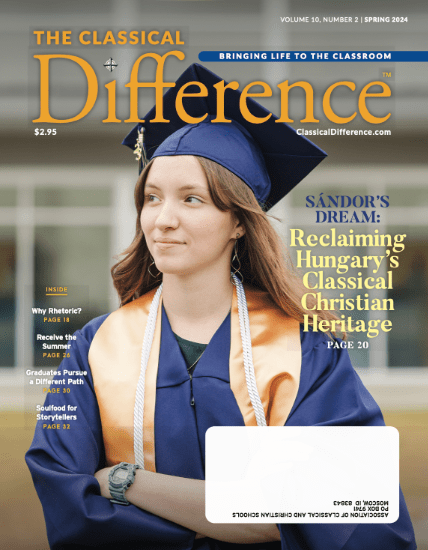For juniors and seniors at classical Christian schools, one of their most pressing questions is, “Where am I going to college?” And not far behind, “Should I continue in the liberal arts or focus on a different path?” Rob Sentz, Chief Innovation Officer at Emsi, a labor analytics company, reports on a recent in-depth study of liberal arts graduates and their job outcomes in the real world. Based on the data, he offers sound advice to parents and students considering the many options. When it comes to future employment, leaning into a liberal arts education has some advantages that you may not have thought about!
 Rob Sentz is the Chief Innovation Officer at Emsi, in Moscow, ID, where he leads in furthering Emsi’s vision and research around labor market data and analytics for higher education, economic development, workforce development, and talent acquisition. Rob also heads up Emsi’s content creation to create meaning out of labor market data and to help a broad array of audiences improve the way they connect people, economies, and work. For the past 13 years, Rob has created newsletters, videos, articles, white papers, and led courses on a wide range of economic and labor market topics. Under his leadership, Emsi data became regularly featured by national news outlets. Rob is a Forbes contributor and has also taught as an adjunct faculty member at NYU School of Professional Studies in New York City. He holds bachelor’s and master’s degrees in environmental science. He enjoys photography and living in the Pacific Northwest with his family.
Rob Sentz is the Chief Innovation Officer at Emsi, in Moscow, ID, where he leads in furthering Emsi’s vision and research around labor market data and analytics for higher education, economic development, workforce development, and talent acquisition. Rob also heads up Emsi’s content creation to create meaning out of labor market data and to help a broad array of audiences improve the way they connect people, economies, and work. For the past 13 years, Rob has created newsletters, videos, articles, white papers, and led courses on a wide range of economic and labor market topics. Under his leadership, Emsi data became regularly featured by national news outlets. Rob is a Forbes contributor and has also taught as an adjunct faculty member at NYU School of Professional Studies in New York City. He holds bachelor’s and master’s degrees in environmental science. He enjoys photography and living in the Pacific Northwest with his family.
Prepared for A Real Job?…A Data Analyst Weighs In On Liberal Arts Degrees
~A Conversation with Rob Sentz
Estimated reading time: 4 minutes (844 words)
For juniors and seniors at classical Christian schools, one of their most pressing questions is, “Where am I going to college?” And not far behind is, “Should I continue in the liberal arts or focus on a different path?”
Rob Sentz, Chief Innovation Officer at Emsi, a labor analytics company in Moscow, ID, addressed these concerns on a recent BaseCamp Live interview. He shared the results from a recent in-depth study of liberal arts graduates and their job outcomes in the real world.
110 million professional profiles
Emsi’s research systems assimilated data from over 110 million profiles to identify the outcomes of students who received a liberal arts degree. To counter the typical view that those graduates will either teach or serve as baristas, the data showed a much broader array of outcomes.
Liberal Arts graduates are hired in all types of careers, with sales, management, and marketing being the top fields, even above education. Sentz compares a liberal arts education to swimming lessons. When you are learning, you hang along the edge or stay in your lane. Eventually, you go all over the pool.
Similarly, a quality liberal arts education prepares a student not only how to think but also to work. “Once people know how to work, they go all over the labor market.”
But what about STEM and technical skills?
With the popularity of STEM (Science, Tech, Engineering and Math) programs, Owens asked him about their growing appeal for parents and students. Because such programs are usually rigorous, angular and challenging, a STEM degree signals to employers that such students are sharp and hard working, Sentz says.
However, he warns that you can encounter a lazy STEM program or even a lazy Liberal Arts program. We should avoid the lazy version of either one.
Technical skills are definitely important but the core human skills learned by Liberal Arts graduates are what employers are desperate for. “You cannot have a technical skill if you don’t also combine it with the human skill. For instance, knowing how to code a website but not being able to communicate with my employer or co-workers or write. You must do both.”
“The limitation of a Liberal Arts degree is that you haven’t been given a lot of technical education so that’s a gap you have to fill in but I think that’s an easier gap to fill in than the other way around,” Sentz points out.
How Liberal Arts degrees help classical Christian students in the job market
The data reveals that only about 35% of all workers stay in jobs related to their degree. That means that 65% of people switch to a second or even third job not related to their degrees. So, not only are there positive outcomes for Liberal Arts graduates, but research shows that their third job will likely be higher paying.
Additionally, employers know that in the long run Liberal Arts students offer more career flexibility. While manufacturing is a highly automated environment requiring less and less people over time, “If you push too hard in STEM education and you focus too much on this one technical area, you are more at risk than others.”
In fact, Sentz notes of his own employees at Emsi, “Our best data scientists/programmers/sales are from New Saint Andrews.” New Saint Andrews, a classical liberal arts college in Moscow, Idaho, graduates students who demonstrate, “a creational mindset, a problem solving mindset, even the idea of breaking down arguments, rhetoric, comfort and flexibility, holding things loosely, even the idea of humor…that sense of reality and humor is so important in the workforce.”
Graduates Should “Lean in” to their Classical Christian Education
Traditionally, and understandably, parents and students consider post secondary education as a means to an end. Sentz believes that while this is a legitimate consideration, classically educated students don’t need to jump ship and change tracks entirely.
“The economy is very much like a body. We need nurses and doctors, engineers and lawyers. There is a time and a place for specific career track education…what I’m also observing in this day and age is higher education is a difficult place. If you grow up in a faithful Christian home with faithful Christian education I would say that continuing that investment…for those four years of your life…its not just about training and technical skills. It’s about continued faithfulness of the development of yourself in college, in church, in community that actually sets you up better.”
Key Takeaway – “Lean into your education. It bears more fruit.”
Based on the research, Sentz challenges juniors and seniors to not be too fast to throw off their Liberal Arts education. Nor should they continue just because they are used to the model. College students should mix in work with their education in order to quickly gain technical skills, just as students do in community colleges.
Ultimately, “faithfulness over time” will bear much fruit in the workforce and in life.
LINKS:
http://www.governing.com/govinstitute/voices/col-community-colleges-vital-role-powering-economies.html
https://www.economicmodeling.com/2018/05/16/wall-street-journal-cites-emsi-alumni-migration/
https://www.economicmodeling.com/robot-ready-reports/
Don’t miss a single podcast! Go to BaseCampLive.com to subscribe












Fascinating perspective! 📊 It’s refreshing to hear from a data analyst about the value of liberal arts degrees in the real job market. Your insights on the blend of skills and adaptability are spot on. Thanks for shedding light on this topic! 🌐🎓 #LiberalArts #CareerInsights